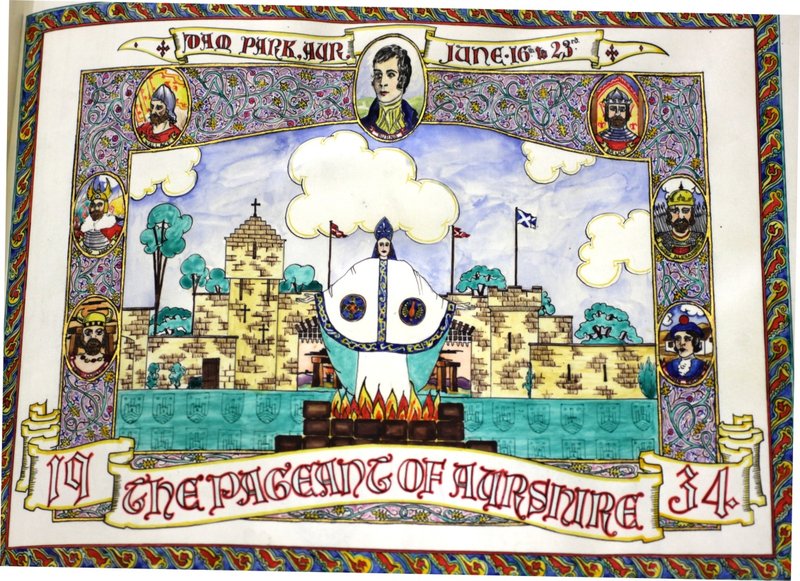Here's Tae Us: no. 1
Well it had to happen... Having spent the past six months looking at the documentary record of historical pageants in Scotland, within the context of a project that takes in shows that took place across most of the British Isles, I now have to come up with some ideas on what pageants north of the border had to say on the issue of Scottish identity. This question is not simply about the narrative content of these (yes Bruce and Wallace or indeed both usually turn up somewhere!) but on what attitudes seem to have underpinned Scottish choices of historical protagonists and notable events and how these were interpreted at the local level. Bearing in mind that most of those I've looked at so far were written and took place when the notion of being both Scottish and British, or indeed, British and Scottish, or dare it be said, just British, hadn't been made into the challenge presently faced in Scotland, were pageant events in Scotland so very different from those in England and Wales?
I do admit that perhaps I have been dodging addressing this issue because in these interesting times there is no avoiding the political hot water in which I might have to paddle! But in for a penny, in for a (currency union) pound...
If the past really does matter in the construction of individual and communal identities (and of course it does) then there's no ducking the issue where research on pageants is concerned (why me?!) So I'll say it, of course Scottish pageants between 1914 and the 1950s, reveal a lot about attitudes felt by Scots about their national character and how they wanted this to be seen.
Maybe I shouldn't worry so much anyway, current political disputes on the independence question do seem to be being argued from an economic point of view, in a fairly reductionist way, culture isn't at the forefront of the ongoing battle, indeed, it isn't really on the agenda. This might lead anyone viewing this debate to think that Scottish identity no longer causes very much soul searching or interest and that, frankly, would be a very misleading notion! Almost certainly the 'yes' campaign believe invoking culture might lead to some troublesome questions they'd rather not have to answer just at present. The independence message seems to be centred on side-stepping the past and instead looking straight ahead to a brave new future. All head and no heart, so to speak. Politically savvy though this may be, I can't see it lasting much longer. I predict whether the politicians want it or not, the issue of how we see ourselves is going to get much more of an airing before September comes around and Scottish voters enter the ballot box. All of which makes research on pageants so resonant in these times.
If they cared to look, how the past was enacted in pageants might give Mr Salmond et al a bit of a clue about how to deal with the identity question without recourse to either damning or defending tartan kitsch because I have been struck by just how little shortbread and Scottie dugs feature in Scottish pageants. Romantic and patriotic they certainly are, replete with the Scots language and its literature, absolutely, but they are not straightforwardly sentimental or easily pigeonholed as examples of 'kailyard' culture (a description I've learned to very suspicious about anyway). Pipe bands and Scottish county dancing do make regular appearances but these activities were a vibrant part of the culture of local communities in mid twentieth century Scotland and canny pageant masters knew how to make use of what was on their doorstep to put on a good show! Most organisers were also too commercially aware to be overly jingoistic and so risk alienating a wider audience and most had writers who alongside a commitment to providing entertainment also cared about interpreting the Scottish past with integrity. However... despite the dozens of enactments of beleaguered covenanting times and of sympathetic interpretations of the trials of those with Jacobite sympathies, I've yet to come across any overtly critical attitudes to the Union in pageants. So might the Better Together campaign have something to learn as well? Yes and no is the answer to this question. In the 2011 census, only 18 per cent of respondents in Scotland identified themselves as Scottish and British, and even less (8 percent) as British. Pageants were interpretations and enactments of the past made in the past, and it seems fairly clear that times have indeed changed where how we self-identify is concerned. Who would be our pageant heroes for 2014 I ask?
Now for the quiz... See if you can spot those used in the Pageant of Ayrshire held in the Dam park, Ayr in 1934, and which incidentally was subtitled, The Struggle for Scottish Independence...

Linda Fleming
